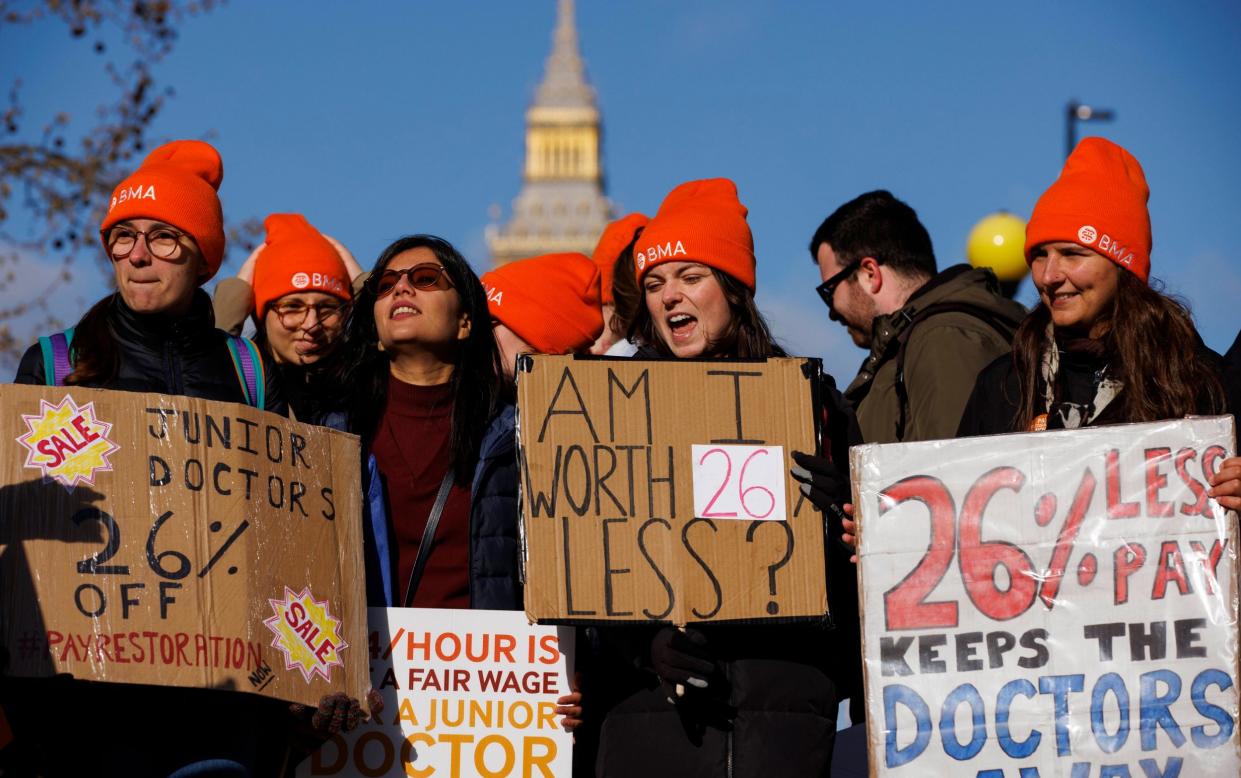NHS cannot cope with continued strikes, chiefs warn

The NHS cannot cope with continued strikes and efforts to cut waiting list backlogs are in jeopardy, health chiefs have warned.
Junior doctors are due to start their third walkout on Wednesday at 7am in a strike lasting 72 hours, which will see medics withdraw from A&E departments and critical care, as well as routine services.
Their leaders at the British Medical Association (BMA) have issued threats to strike for three days a month throughout “summer and winter... for as long as it takes”.
Dr Vin Diwakar, the NHS medical director for secondary care, said on Saturday that the situation facing the NHS was “clearly unsustainable”, with more than half a million operations and appointments already cancelled as a result of industrial action.
Hospital consultants have also announced strike dates for next month, if their BMA ballot is successful, in what would be the eighth month of NHS industrial action.
Latest NHS figures show a record 7.4 million people on waiting lists. Data published on Thursday also show more than 371,000 people waiting at least a year for treatment, up from 360,000 the previous month.
Dr Diwakar said NHS staff would make every effort to prioritise urgent cases, but said the continued disruption was hindering the ability of the health service to provide care.
“Industrial action has hampered the health service’s ability to deliver care for almost seven months and this is clearly unsustainable, with around half a million appointments needing to be rescheduled so far,” he said.
“Our staff are continuing to prioritise those in most urgent need of care, but the disruption caused by the strikes is inevitably affecting our ability to deal with growing demand and to tackle the backlog.”
Health chiefs urged anyone in need of urgent care to still seek it during the 72-hour period, urging the public to reserve 999 for life threatening emergencies.
‘No-one wants to see strike action happen’
Dr Diwaker also said anyone with planned appointments should continue to attend them, unless told otherwise.
“Urgent and emergency care will be prioritised, and it is vital people use NHS 111 online and other services for non-urgent health needs and continue to use 999 in life-threatening emergencies only,” he said.
“No-one wants to see strike action happen, and we want to thank the public for being understanding and for continuing to use our services responsibly during this challenging period.”

Rishi Sunak has made cutting waiting lists one of his key priorities, promising to elimate year-long waits by March 2025. However, a milestone to eliminate 18-month waits by April was missed last month.
So far more than 530,000 operations and appointments in England have been cancelled as a result of strikes by nurses, doctors and other health professionals.
The total of patients affected is likely to be far higher, as many hospitals reduced the number of scheduled appointments once they were aware of forthcoming action.
‘Unreasonable’ demands
The BMA junior doctors committee has called for a 35 per cent hike in wages, but Steve Barclay, the Health Secretary, branded the demand “unreasonable” and said there had to be “movement on both sides”.
Next week’s strikes will see junior doctors abandon all services, including A&E, with their senior colleagues asked to “act up” to fill their roles.
During the proposed strikes for July, hospital consultants will provide “Christmas Day cover”, meaning they will continue to provide all emergency services, but many routine services will be stopped.
Almost 300,000 members of the Royal College of Nursing in England are currently being asked to renew their mandate for industrial action until the end of the year
Their leader Pat Cullen has threatened strikes until Christmas, after the union’s members rejected a five per cent pay offer plus bonus payments which she had backed.
On Friday, Sir Julian Hartley, chief executive of NHS Providers, which represents NHS hospitals, said: “We can’t go on like this. We can’t let strikes become ‘business as usual’ for trusts and their patients.”

 Yahoo News
Yahoo News 
